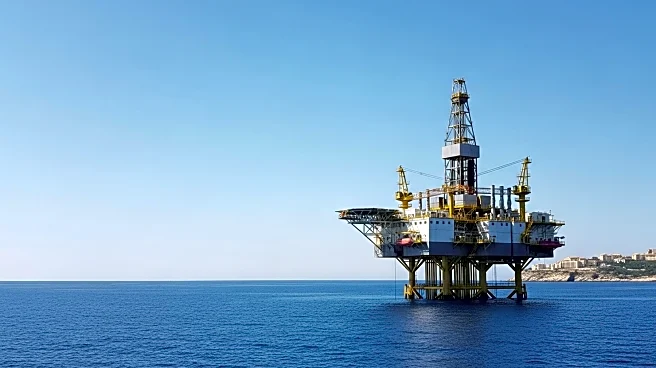What's Happening?
QatarEnergy has announced an agreement with Shell to acquire a 27% participating interest in the North Cleopatra block offshore Egypt. This strategic move highlights QatarEnergy's expanding influence in the East Mediterranean and Africa. The deal, which is still awaiting approval from Egyptian authorities, will result in Shell retaining a 36% operating stake in the block. Chevron holds a 27% stake, while Egypt's Tharwa Petroleum Company owns the remaining 10%. The North Cleopatra block is located in the Herodotus Basin, covering over 3,400 square kilometers of seabed with depths reaching up to 2,600 meters. This acquisition is part of QatarEnergy's broader strategy to secure assets in major oil and gas basins worldwide, including regions like Guyana, Lebanon, Namibia, and South Africa.
Why It's Important?
The acquisition by QatarEnergy is significant as it underscores the company's growing role in the global energy sector, particularly in the strategically important East Mediterranean region. This move could potentially enhance QatarEnergy's portfolio and influence in the oil and gas industry, providing access to potentially lucrative reserves. For Egypt, the involvement of a major player like QatarEnergy could bring in additional investment and expertise, potentially boosting the country's energy sector. The deal also reflects the ongoing global competition for energy resources, with major companies seeking to secure strategic assets to ensure long-term growth and stability.
What's Next?
Pending approval from Egyptian authorities, the deal is expected to proceed, potentially leading to increased exploration and development activities in the North Cleopatra block. Stakeholders, including Shell and Chevron, may need to adjust their strategies to accommodate QatarEnergy's involvement. The broader implications for the region could include increased geopolitical interest and investment in the East Mediterranean's energy resources. Additionally, the deal may prompt other energy companies to pursue similar acquisitions in the region, further intensifying competition.
Beyond the Headlines
This acquisition could have deeper implications for the global energy market, particularly in terms of energy security and geopolitical dynamics. As countries and companies vie for control over key energy resources, the balance of power in the global energy market could shift. The involvement of QatarEnergy in the East Mediterranean may also influence regional alliances and partnerships, potentially affecting diplomatic relations and economic policies.











